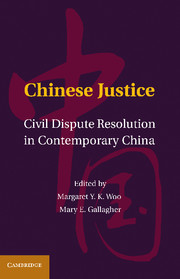Book contents
- Frontmatter
- Contents
- Tables and Figures
- Contributors
- Acknowledgments
- Abbreviations
- Glossary
- Introduction
- PART I LEGAL DEVELOPMENT AND INSTITUTIONAL TENSIONS
- PART II PU FA AND THE DISSEMINATION OF LAW IN THE CHINESE CONTEXT
- 5 The Impact of Nationalist and Maoist Legacies on Popular Trust in Legal Institutions
- 6 Public Attitudes toward Official Justice in Beijing and Rural China
- 7 Users and Non-Users: Legal Experience and Its Effect on Legal Consciousness
- 8 With or without the Law: The Changing Meaning of Ordinary Legal Work in China, 1979–2003
- PART III LAW FROM THE BOTTOM UP
- Conclusion: Chinese Justice from the Bottom Up
- Index
- References
5 - The Impact of Nationalist and Maoist Legacies on Popular Trust in Legal Institutions
Published online by Cambridge University Press: 05 July 2011
- Frontmatter
- Contents
- Tables and Figures
- Contributors
- Acknowledgments
- Abbreviations
- Glossary
- Introduction
- PART I LEGAL DEVELOPMENT AND INSTITUTIONAL TENSIONS
- PART II PU FA AND THE DISSEMINATION OF LAW IN THE CHINESE CONTEXT
- 5 The Impact of Nationalist and Maoist Legacies on Popular Trust in Legal Institutions
- 6 Public Attitudes toward Official Justice in Beijing and Rural China
- 7 Users and Non-Users: Legal Experience and Its Effect on Legal Consciousness
- 8 With or without the Law: The Changing Meaning of Ordinary Legal Work in China, 1979–2003
- PART III LAW FROM THE BOTTOM UP
- Conclusion: Chinese Justice from the Bottom Up
- Index
- References
Summary
After thirty years of reform in China, one can legitimately wonder whether individual or local experiences with the Maoist state are still relevant to the lives of ordinary Chinese. The shift to a market economy; the radical transformation of the workplace, housing, consumptions patterns; and countless other aspects of daily life leave few observational clues about the long-term consequences of three decades of Maoism. Few would question the historical importance of the Chinese revolution, but it is incumbent on students of contemporary issues to demonstrate empirically whether nearly one generation after the regime's break from Maoism, individual decisions and beliefs are still decisively linked to these historical events.
As the People's Republic of China (PRC) approaches its seventh decade, we may be even less willing to explore the relevance of the 1949 divide between the so-called “old” and “new” Chinas. Social scientists who conduct survey research in the PRC no longer can interview respondents with living memories of the Nationalist regime. Furthermore, the regime's long-standing emphasis on sharply demarcating the post-1949 political and social landscape from China's historical experience has further weakened interest in exploring whether and how antecedent regimes have had any impact on contemporary mass opinion and behavior. Yet several aspects of China's reform era compel observers to look back in search of explanations that cannot be easily rooted in contemporary institutional or cultural settings.
- Type
- Chapter
- Information
- Chinese JusticeCivil Dispute Resolution in Contemporary China, pp. 139 - 168Publisher: Cambridge University PressPrint publication year: 2011
References
- 3
- Cited by



